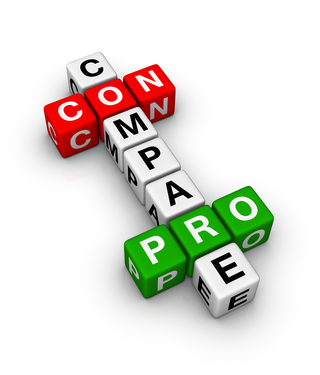Do you outsource or use in-house resources to conduct Win/Loss interviews and the analysis? This is a question I have been asked frequently in the 25 y ears that I have done Win/Loss work. There are pros and cons to each approach, and your company’s and industry’s cultures will often dictate which approach will work better for you. Sometimes it’s a combination of in-house and consultant resources that works best.
ears that I have done Win/Loss work. There are pros and cons to each approach, and your company’s and industry’s cultures will often dictate which approach will work better for you. Sometimes it’s a combination of in-house and consultant resources that works best.
- Who will be the best at obtaining the customer intelligence and analyzing it?
- Who will be best for collaboration among the different parties (sales and other employees, customers, non-customers) to maximize what you will learn from a Win/Loss program?
Outsourcing Advantages According to numerous sources, most buyers will rarely reveal the full story to your company’s sources, especially to sales. Buyers are usually more candid with a third party, who is viewed as neutral and objective. They can often uncover hidden customer satisfaction issues that the customer might be unwilling to share directly with your company.
Third parties have built an expertise to get people to share from conducting Win/Loss interviews for a living. This gives them an advantage over company employees who usually don’t conduct Win/Loss interviews and the ensuing analysis as a full time job.
Sometimes you are too close to the situation to think of the right questions and pose them in the right way which an objective third party offers. Thus third party interviewers are more apt to ask those questions which will expose your company’s blind spots.
Due to company politics, your sales force might prefer to have an outside party conduct the Win/Loss interviews. Often enough there is some amount of tension between sales and marketing, so sales might share less of the relevant customer/non-customer pre-interview information with a company employee. In this vein, sales might more likely provide an outside party an introduction to their customers, which heightens the odds that the customer will agree to a Win/Loss interview.
If you outsource Win/Loss interviews, you will need to get senior level budget approval. The executive who is paying for Win/Loss will watch closely for what results you get from these interviews, and more importantly what changes you make that improve your company’s ROI. Thus, the executive is more likely to insist that the ROI improvement changes are implemented.
Outsourcing gives companies the flexibility to decide which pieces of Win/Loss they are best suited for versus a consultant. For example, some companies outsource the Win/Loss interviews, but do the analysis in-house. They might split up the Win/Loss interviews between themselves and the consultant. Others might use a consultant to train them on how to develop a win loss program, and then create their program in-house.
In-House Advantages
The plus for in-house interviewing is that no one knows your business like you do. While the third party is objective and presumably an expert interviewer—which will encourage your buyers to share more readily—they may not probe as deeply since they don’t know your business as well as you do.
There is the risk that the consultant you hire will not be a good fit to conduct interviews in your industry or with your customer base.
There is the risk that the consultant won’t connect well with your company employees to create the best Win/Loss questions.
Your customers may prefer to speak to a company employee versus an outside consultant.
Your sales force may be more comfortable having a company employee conduct the Win/Loss interviews since they might trust a company employee more than an outside consultant.
- They may be more comfortable sharing the relevant customer/non-customer pre-interview information with a company employee.
- They may be more likely to provide a letter of introduction to enable the Win/Loss interview for an internal employee.
The consultant will provide the analysis of the Win/Loss interviews, and like sales, be on to the next client. Meanwhile the internal company interviewers are company employees, thus are more accountable.
The expense of using an outside source will have to come out of the company’s budget. Remember: using in-house sources isn’t free. The in-house resources will spend time doing Win/Loss versus other job responsibilities.
Your Turn
- If you don’t have a Win/Loss program, what are your thoughts about developing an in-house program versus outsourcing?
- If you do Win/Loss, please share your experiences with in-house versus outsourcing.
We are happy to be your outsourcing partner to develop or to train you on how to develop a Win/Loss program.
Here is a SlideShare on “how to conduct” Win/Loss analysis.
Win/Loss Analysis book gives you a process to learn why you’re losing business and how to keep more of it!
